A Glass of
Water
a story by
Gabriel Josipovici
© Gabriel Josipovici, 2000, 2002
a story by
Gabriel Josipovici
© Gabriel Josipovici, 2000, 2002
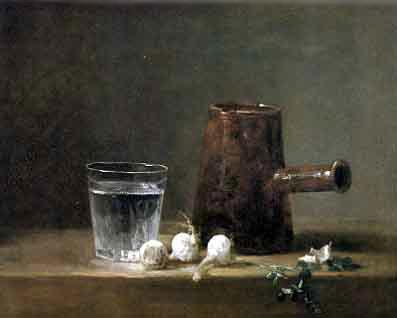
There
is no pleasanter or more instructive way to spend a morning than to go
round an exhibition with Ken. His knowledge of art is so extensive, his
eye so good, his feeling for the mood of a picture and of the occasion
so assured that the time runs by unnoticed and yet, in retrospect, I find
myself returning again and again to this 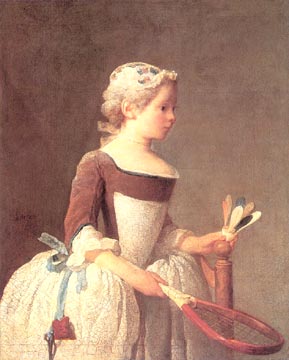 moment
of our conversation or that.
moment
of our conversation or that.
Going round the Chardin exhibition with Ken was a particular pleasure. Chardin is a painter we both warm to, but so little that has been written about him seems to correspond in any way to one's experience of those mysterious still still lifes, those mysterious still figures. We stood for a long time in front of the "Glass of Water and Coffee Pot" of 1760. Someone next to us was informing his companion that the painting was all about hierarchy and inversion, and pointed out that the handle of the pot appears to be both turned towards us and seen in profile, "a veritable feat of the painter's art." My own thoughts were concerned rather with the strange feeling of peace and well-being the picture gave me, even in a crowded gallery on a surprisingly hot Spring morning. Ken just said: "That glass — the water is always fresh, isn't it?"
We stood in front of the "Girl with Shuttlecock," painted more than twenty years earlier yet unmistakably a product of the same spirit. "The feathers grow out of her hand," Ken said, and I knew what he meant: her gaze, which takes in what is before her, is more intently fixed on the secret of her body, so tightly cased around the bust in her plain but elegant dress, yet still dreaming of flight. "That's what all his work is," Ken said, pointing to the spinning top which gives its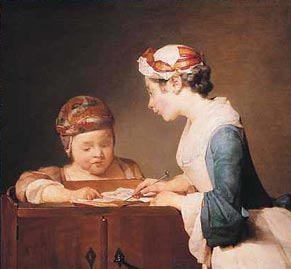 name to the "Boy with the Top." We looked at it in silence.
name to the "Boy with the Top." We looked at it in silence.
Afterwards we went back to his place and Esther made us a light lunch. Her hands are always cool. She had not yet seen the show but she has always loved the Chardins in the National Gallery, the incomparable "House of Cards" and the painting called "The Lesson," in which a young nurse or older sister takes a child through his first reading exercises, using a knitting needle to point to the words, and the child, barely reaching up to the table, seems to struggle with total concentration, to decipher the still mysterious characters. "I can't imagine seeing sixty works by him in one go," she said. "Just concentrate on two or three," Ken said. "Forget the others." He stroked her hand across the table, absent-mindedly. "Can you do that?" she asked me. "If the rest are all around you?" "Not if I don't already know them," I said. Her eyes arc sometimes blue, sometimes green and sometimes violet. It's most disconcerting. "I could ring Roger," Ken said, "and see if he can get you in before ten." She didn't say anything, and we sat round the table like that, with him stroking her white hand and her violet eyes staring into mine. We often sit like that when we have eaten. Sometimes I close my eyes and then I feel her hand in mine, feel nothing but her hand, and then I open them again and see her eyes, see nothing but her eyes. When I have spent a morning at the National Gallery or at some new show perhaps, at the Hayward or the Royal Academy, it is like a fulfilment of the promises of the day to come home and find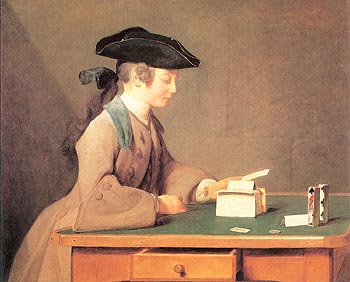 that
she has made lunch and we sit, practically in silence, holding hands.
Often we push the plates aside and sit like that, our legs entwined under
the table, looking into each other's eyes. There is no need to speak,
and if we speak it is more out of the desire to let our voices float in
the air about us than because we have anything to say. I thought today
as I went slowly round the Chardin exhibition at the Royal Academy before
going home to her of the shows I had been round with Ken, and wondered
what he would have had to say, it was always so illuminating, such a genuine
pleasure to see a good show with him, but there it is, everything passes,
the good and the bad, everything passes.
that
she has made lunch and we sit, practically in silence, holding hands.
Often we push the plates aside and sit like that, our legs entwined under
the table, looking into each other's eyes. There is no need to speak,
and if we speak it is more out of the desire to let our voices float in
the air about us than because we have anything to say. I thought today
as I went slowly round the Chardin exhibition at the Royal Academy before
going home to her of the shows I had been round with Ken, and wondered
what he would have had to say, it was always so illuminating, such a genuine
pleasure to see a good show with him, but there it is, everything passes,
the good and the bad, everything passes.
The house does not feel empty. She fills it with her presence. I wish she had taught me how to make that quiche which was her speciality. I tried to make it once or twice but I must have left out some special ingredient or not mixed the elements correctly, it always came out heavy and dry, and after a while I gave up. I make myself a salad and, sometimes, if I feel hungry, a soft-boiled egg, and I cut up the toast into fingers, as my mother taught me. I do not exactly miss her, though my legs fumble for her under the table if I am not careful. Her presence in the house is particularly strong when I come back from a show, but it is a benign presence. I am filled with her from the soles of my feet to the top of my head, and I am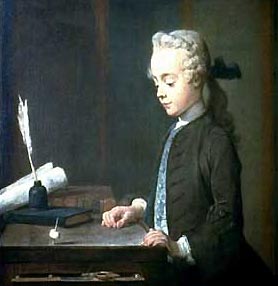 particularly aware of her in my chest, as though there was hardly room
inside my pullover for the two of us.
particularly aware of her in my chest, as though there was hardly room
inside my pullover for the two of us.
Sometimes I leave the meal half-eaten and wander through the house, touching the objects she touched, letting my hand rest on the back of the chair in which she liked to sit. Though there is a little dust on the desk in her study and I stand there making patterns in it with my finger, no pattern shows, and though I stare into the mirror in the bathroom there is no answering reflection. That is the nature of our condition. It causes me no pain, and, when one comes to think about it, it even has distinct advantages. In a crowded gallery, even on a hot day I feel no discomfort, experience no constraint. I can concentrate totally on each painting, oblivious of the people jostling round me. It is as though I was inside the painting, inside the tight bodice of the little girl with her racket and feathered shuttlecock, inside the hands of the boy looking at the spinning top as they rest casually on the edge of the table, and, yes, inside that glass of water which is always fresh and always present. Everything passes, it tells me, everything passes, including ourselves, and everything is always present.
 moment
of our conversation or that.
moment
of our conversation or that.Going round the Chardin exhibition with Ken was a particular pleasure. Chardin is a painter we both warm to, but so little that has been written about him seems to correspond in any way to one's experience of those mysterious still still lifes, those mysterious still figures. We stood for a long time in front of the "Glass of Water and Coffee Pot" of 1760. Someone next to us was informing his companion that the painting was all about hierarchy and inversion, and pointed out that the handle of the pot appears to be both turned towards us and seen in profile, "a veritable feat of the painter's art." My own thoughts were concerned rather with the strange feeling of peace and well-being the picture gave me, even in a crowded gallery on a surprisingly hot Spring morning. Ken just said: "That glass — the water is always fresh, isn't it?"
We stood in front of the "Girl with Shuttlecock," painted more than twenty years earlier yet unmistakably a product of the same spirit. "The feathers grow out of her hand," Ken said, and I knew what he meant: her gaze, which takes in what is before her, is more intently fixed on the secret of her body, so tightly cased around the bust in her plain but elegant dress, yet still dreaming of flight. "That's what all his work is," Ken said, pointing to the spinning top which gives its
 name to the "Boy with the Top." We looked at it in silence.
name to the "Boy with the Top." We looked at it in silence.
Afterwards we went back to his place and Esther made us a light lunch. Her hands are always cool. She had not yet seen the show but she has always loved the Chardins in the National Gallery, the incomparable "House of Cards" and the painting called "The Lesson," in which a young nurse or older sister takes a child through his first reading exercises, using a knitting needle to point to the words, and the child, barely reaching up to the table, seems to struggle with total concentration, to decipher the still mysterious characters. "I can't imagine seeing sixty works by him in one go," she said. "Just concentrate on two or three," Ken said. "Forget the others." He stroked her hand across the table, absent-mindedly. "Can you do that?" she asked me. "If the rest are all around you?" "Not if I don't already know them," I said. Her eyes arc sometimes blue, sometimes green and sometimes violet. It's most disconcerting. "I could ring Roger," Ken said, "and see if he can get you in before ten." She didn't say anything, and we sat round the table like that, with him stroking her white hand and her violet eyes staring into mine. We often sit like that when we have eaten. Sometimes I close my eyes and then I feel her hand in mine, feel nothing but her hand, and then I open them again and see her eyes, see nothing but her eyes. When I have spent a morning at the National Gallery or at some new show perhaps, at the Hayward or the Royal Academy, it is like a fulfilment of the promises of the day to come home and find
 that
she has made lunch and we sit, practically in silence, holding hands.
Often we push the plates aside and sit like that, our legs entwined under
the table, looking into each other's eyes. There is no need to speak,
and if we speak it is more out of the desire to let our voices float in
the air about us than because we have anything to say. I thought today
as I went slowly round the Chardin exhibition at the Royal Academy before
going home to her of the shows I had been round with Ken, and wondered
what he would have had to say, it was always so illuminating, such a genuine
pleasure to see a good show with him, but there it is, everything passes,
the good and the bad, everything passes.
that
she has made lunch and we sit, practically in silence, holding hands.
Often we push the plates aside and sit like that, our legs entwined under
the table, looking into each other's eyes. There is no need to speak,
and if we speak it is more out of the desire to let our voices float in
the air about us than because we have anything to say. I thought today
as I went slowly round the Chardin exhibition at the Royal Academy before
going home to her of the shows I had been round with Ken, and wondered
what he would have had to say, it was always so illuminating, such a genuine
pleasure to see a good show with him, but there it is, everything passes,
the good and the bad, everything passes.The house does not feel empty. She fills it with her presence. I wish she had taught me how to make that quiche which was her speciality. I tried to make it once or twice but I must have left out some special ingredient or not mixed the elements correctly, it always came out heavy and dry, and after a while I gave up. I make myself a salad and, sometimes, if I feel hungry, a soft-boiled egg, and I cut up the toast into fingers, as my mother taught me. I do not exactly miss her, though my legs fumble for her under the table if I am not careful. Her presence in the house is particularly strong when I come back from a show, but it is a benign presence. I am filled with her from the soles of my feet to the top of my head, and I am
 particularly aware of her in my chest, as though there was hardly room
inside my pullover for the two of us.
particularly aware of her in my chest, as though there was hardly room
inside my pullover for the two of us. Sometimes I leave the meal half-eaten and wander through the house, touching the objects she touched, letting my hand rest on the back of the chair in which she liked to sit. Though there is a little dust on the desk in her study and I stand there making patterns in it with my finger, no pattern shows, and though I stare into the mirror in the bathroom there is no answering reflection. That is the nature of our condition. It causes me no pain, and, when one comes to think about it, it even has distinct advantages. In a crowded gallery, even on a hot day I feel no discomfort, experience no constraint. I can concentrate totally on each painting, oblivious of the people jostling round me. It is as though I was inside the painting, inside the tight bodice of the little girl with her racket and feathered shuttlecock, inside the hands of the boy looking at the spinning top as they rest casually on the edge of the table, and, yes, inside that glass of water which is always fresh and always present. Everything passes, it tells me, everything passes, including ourselves, and everything is always present.